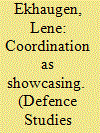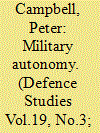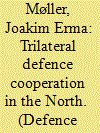|
|
|
Sort Order |
|
|
|
Items / Page
|
|
|
|
|
|
|
| Srl | Item |
| 1 |
ID:
167458


|
|
|
|
|
| Summary/Abstract |
In complex operations such as the interventions in Iraq and Afghanistan, where multiple government ministries are involved in putting together a state’s contributions, the use of national-level coordination bodies has become more widespread. Research has taken for granted that the rationale behind these bodies reflects their declared aim – enhanced coordination as a means to improve mission effectiveness. However, they appear to have had modest effect on coordination. That notwithstanding, they seem to remain popular. This prompts us to ask why such bodies are actually established. This article – based on in-depth interviews and archival records – critically explores the establishment of Norway’s ad hoc, inter-ministerial, political-level Afghanistan Forum. Distinguishing between a structural-instrumental, a cultural-institutional and an environmental perspective from organizational theory to structure the analysis, this article shows that the declared purpose of the forum, inter-ministerial coordination, proved less important than showcasing coordination efforts and keeping the coalition together. In addition, national traditions in handling coordination challenges in the central government apparatus and powerful international reforms helped bring the forum about. This has implications for research on the rationale and effectiveness of these bodies, and also for understanding their policy relevance.
|
|
|
|
|
|
|
|
|
|
|
|
|
|
|
|
| 2 |
ID:
167461


|
|
|
|
|
| Summary/Abstract |
The paper adds to the debate on the relationship between military spending and economic growth by analysing the contribution of a military university centre to regional economic development. It goes beyond traditional economic impact studies by including research related effects and integrating “third stream” activities. Conceptualization and categorization are carried out to thoroughly analyse the different dimensions of knowledge and “third stream” actions. The analysis is performed from its settlement and during its first 5 years of existence which allows showing how the strategy of community engagement is developed. The conclusion suggests that, as traditional military roles extend, and military education institutions become higher education institutions, a comprehensive evaluation should be taken into account to enrich the public debate on government spending.
|
|
|
|
|
|
|
|
|
|
|
|
|
|
|
|
| 3 |
ID:
167459


|
|
|
|
|
| Summary/Abstract |
Military officers often oppose political interference in the conduct of war. Political leaders respond by citing Clausewitz’s contention that “war is the continuation of politics with the addition of other means.” Scholarship in security studies and civil-military relations argues that civilians are right to oppose military autonomy because it serves the parochial interests of the military. However, through the dialectical relationship between the violent essence of war and its political nature, Clausewitz provides an alternative explanation for military demands for autonomy. He shows that military and political leaders are prone to an incomplete understanding of war that can undermine strategy and policy.
|
|
|
|
|
|
|
|
|
|
|
|
|
|
|
|
| 4 |
ID:
167456


|
|
|
|
|
| Summary/Abstract |
What do UK policymakers mean when they say that Britain’s strategic environment is returning to “multipolarity”? In realist international theory, polarity is a specific causal concept; the number of powers capable of balancing even the most capable other state(s) in the international system (“poles”) is taken to determine the system’s stability. Does the post-2017 appearance of polarity references in British security policy documents therefore reflect some unexpected UK renaissance of realist thought? Or is something else going on, as recent work by Ben Zala suggests? This article will demonstrate that, while UK official usage of the “multip–” word has indeed flourished recently, the term is actually being used in a more elastic, less bounded way than realism prescribes in order to generate other kinds of political effect. Specifically, “polarity” (and its “multi-” prefix) is used to characterise the behaviour of those major states that oppose Western-preferred international order, to elide Britain’s own relative power/status tensions, and to capture an expansive laundry-list of perceived international dangers. The article then discusses five ways in which a shift in polarity could negatively affect Britain; important consequences that merit preparatory contemplation, yet that an imprecise, catch-all understanding of “multipolarity” too readily obscures.
|
|
|
|
|
|
|
|
|
|
|
|
|
|
|
|
| 5 |
ID:
167457


|
|
|
|
|
| Summary/Abstract |
Norway, Sweden and Finland have proclaimed a willingness to cooperate militarily in a future crisis or conflict despite their diverging alliance affiliation. This article assesses their ability to do so through various elements affecting their interoperability, with Arctic Challenge, a multinational military exercise, as an empirical basis. The analysis finds that the NATO/non-NATO-divide has a negative impact on the trilateral defence cooperation, especially on exchange of information and aspects related to command and control. At the same time, Finland and Sweden have become largely NATO-standardized through their active partnership with the Alliance. This has affected interoperability aspects, such as communication, culture, and the compatibility of technical solutions, in a positive manner. Through agreements with the Alliance, as well as domestic legal changes, the two NATO-partners have facilitated receiving military assistance from Norway and other NATO-members during a crisis. Other agreements between the Nordic countries, however, have been limited to peacetime.
|
|
|
|
|
|
|
|
|
|
|
|
|
|
|
|
| 6 |
ID:
167460


|
|
|
|
|
| Summary/Abstract |
The current combat motivation model based on primary group thesis assumes that the main force behind motivation is peer-bonding or otherwise known as unit cohesion. Cohesion is perceived as an all-encompassing factor that leads to satisfactory (or unsatisfactory in lack thereof) military effectiveness and performance in conflict environments. However, the article identifies three main problems with this perspective: 1. mono-dimensional view of motivation; 2. motivation based on heteronomy, and 3. self-reporting bias. The current model does not consider motivation as a separate entity from cohesion; it does not place motivation as fundamental human value; lastly, it takes motivation as granted by-product of socialization. The article proposes a new combat motivation model based on The Self-Determination Theory. The theory maintains that human motivation requires satisfaction of three psychological needs of competence, relatedness, and autonomy. The degree of satisfaction of those three needs leads to different types of regulated motivations – a continuum from intrinsic to extrinsic – each of which has specifiable consequences for learning, performance, and well-being of an individual.
|
|
|
|
|
|
|
|
|
|
|
|
|
|
|
|
|
|
|
|
|